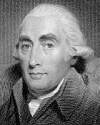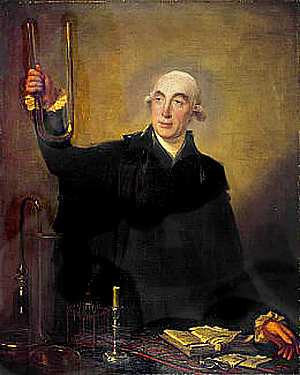 (source)
(source)
|
Joseph Black
(16 Apr 1728 - 6 Dec 1799)
Scottish chemist and physicist who investigated and made quantitative experiments with carbon dioxide, known as "fixed air." He also identified the latent ("hidden") heat involved with a substance's change of state, realized the difference between heat and temperature, and measured specific heats.
|
Defining the True Scientist
The Philosopher, the Artist and the Trader
by Joseph Black
Excerpt from Lectures on the Elements of Chemistry
[p.3] …you may perceive something of the distinction which I think necessary to keep in view between art and science, between the artist and the man of knowledge, or the philosopher. The man of knowledge, the philosopher, is he who studies and acquires knowledge in order to improve his own mind; and with a desire of extending the department of knowledge to which he turns his attention, or to render it useful to the world, by discoveries, or by inventions, which may be the foundation of new arts, or of improvements in those already established. Excited by one or more of these motives, the philosopher employs himself in acquiring knowledge and in communicating it. The artist only executes and practises what the philosopher or man of invention has discovered or contrived, while the business of the trader is to retail the productions of the artist, exchange some of them for others, and transport them to distant places for that purpose.
I may illustrate this distinction between the man of science and the artist still more by an example or two. While Sir Isaac Newton was employed in his experimental inquiry concerning the nature and laws of light, and was led by his genius from one beautiful discovery to another, until he produced the admirable work which he has left us on this subject, he was acting the part of the philosopher. His observations and discoveries induced him to believe that, by reason of the nature of light, and the manner in which it is affected by transparent refracting mediums, the telescopes in use were capable of only a very limited degree of magnifying power. But the manner in which it was reflected exhibited no such [p.4] obstacles to amplification. He therefore proposed that telescopes should be attempted, which should perform their effect by reflection; by which he saw that a much more perfect and distinct image might be formed. He went still farther: he tried different mixtures of metals, to learn which would form the best composition for the mirrors which must be employed in these telescopes instead of the glass lenses hitherto employed. He even tried different ways of grinding and polishing those mirrors, in order to learn how to give them the most perfect figure and the most exquisite polish, so as to reflect the brightest and most perfect image. After having thus completed all the improvements he had projected, although he published directions for making a reflecting telescope in perfection, he was, in all this, still acting the part of the philosopher. The person who merely put in practice the directions given by Newton, following implicitly the rules which he had laid down, was the humble artist. Sir Isaac Newton, for want of good workmen, acted this part also, in all its detail, being unable to obtain a good reflecting telescope in any other way than that of making it himself, according to his own rules.
In like manner, we find numerous operators who, either with their own hands, or by the hands of others whom they employ, exercise the various branches of the valuable art of pottery. These persons, by an apprenticeship, or otherwise, have learned how to choose and to mix the proper materials; how to form the vessels; to apply the glazing and other decorations; and lastly, how to give the proper degree of fire to consolidate and finish the ware. These are all artists, while they only exert in practice the skill they have acquired, Whether by communication from others, or by efforts of their own ingenuity. But if there be a Wedgewood among them, who takes pleasure in attaining more extensive knowledge of the subject, who, by comparing the practice of other potters with his own, and by making new trials, and varying the composition, the glazing, the firing, and other parts of the process, endeavors to make improvements upon the art, or to understand it better than before; such a person, in my opinion, is [p.5] a philosopher, or a man of thought, study, and invention. Even in medicine, the same distinction may, I think, be very properly made. The physician who only practises what he has learned, treats his patient as we say secundum artem, and gives himself no further trouble, should be reckoned an artist: but, when he bestows uncommon attention and study upon the diseases he has occasion to treat, endeavors to understand them better than ordinary, or to improve the method of curing them, he, in so far, is certainly one of the most useful philosophers—a medical philosopher.
It may be objected, perhaps, that I use some freedom with common language in this manner of applying the term philosopher, when I do not confine it, as is commonly done, to men of great learning and retirement, but apply it to any man who endeavors to acquire knowledge, or thinks and reasons upon any useful subject. In this sense, the term, it may be said, will apply to a plain farmer, if he only studies the construction of his plough, and how far it is adapted to produce in the best manner the effect for which it is intended, and perhaps endeavors to improve it. And, in so far as he does this, I have no scruple to reckon him a philosopher; a rustic one, he may possibly be thought, but a more useful one than many who think the title indisputably theirs. Men of great learning and retirement often contribute little or nothing to the progress of improvement. They spend their time in learning and admiring the inventions of others, without ever [p.6] proposing a new thought of their own, or ever discovering one useful power in nature
If this distinction, therefore, between science and art be allowed me, I would not define the system of knowledge which I propose to comprehend in these lectures, by saying that it is an art. An art is a set of rules and directions for the use of an artist, who, by practising them, is enabled to obtain certain productions which are the object of the art. A science is a body, or system of knowledge; and chemistry, as now generally studied and taught, is undoubtedly a science, which, though it has given origin to numerous arts, is distinct from them all, as you will more easily perceive when we are farther advanced in this course.
- Science Quotes by Joseph Black.
- 16 Apr - short biography, births, deaths and events on date of Black's birth.
- Joseph Black - Biography from Lives of Eminent and Illustrious Englishmen (1837).





